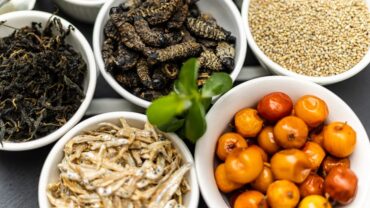“This flavor is for my grandmother,” says Tapiwa Guzha, pointing to a rooibos and fennel granita on the menu at his ice cream store in Cape Town, South Africa. “She grew fennel in her garden.”
Guzha is a microbiologist turned ice-cream maker who was raised to grow and eat fruit and vegetables straight from his grandmother’s garden. Taking inspiration from the flavors of his childhood, he makes his ice cream with indigenous African ingredients such as blackjack, sorghum, millet, edible clay, hibiscus, baobab, and okra. In doing so, he invites diners into a conversation about what constitutes local food in Cape Town, a city indelibly associated with apartheid and Eurocentrism.
The name of Guzha’s store, Tapi Tapi, plays on both his own first name and the colloquial term for “yum yum” in Shona, his mother tongue. Guzha grew up in his grandmother’s home in Harare, Zimbabwe. They lived in the suburbs, but the garden was abundant with a variety of fruits, vegetables, herbs, and chickens. Guzha learned how to farm and grow food. He learned about medicinal properties of certain plants. He also intimately knew the meaning of communal eating. Living with up to 12 kids at times, his grandmother had to make food go a long way.
When Guzha moved to Cape Town for university he started to experiment with cooking. He was great at making ice cream and saw it as much of a scientific process as anything else he was working on. “I’d go from doing lab work to going home and doing more lab work,” he says. As an immigrant in South Africa, Guzha distanced himself from South African politics. But when he moved to Stellenbosch University for his PhD, a notoriously white Afrikaans town outside of Cape Town, it was impossible to ignore. According to Guza’s experience, “Stellenbosch is only Black in the sense of the people who work there. If you go to Stellenbosch after 6 p.m. it’s not a Black town, there are no Black people around.” Stellenbosch University, the alma mater of apartheid architect Hendrik Verwoerd, has been called out for institutional racism countless times, culminating in a mass student movement against racism in 2015. In these surroundings, nothing reflected Guzha’s cultural heritage or that of Black people in South Africa, from language, food, clothing, and entertainment to ways of being and communicating. Guzha recalls that most signs during his time there were in English or Afrikaans, and that the first time he saw a sign in Xhosa, it said “Trespassers will be prosecuted.”
The jarring experience of living in Stellenbosch grew his awareness of injustice and racial inequality. On a trip to Bali, Guzha was reminded of the connectedness he’d been missing over the recent years, witnessing the community practices among Balinese people. Where he stayed, families lived in compounds similar to what he grew up with in Zimbabwe, working together farming, growing their own food, and eating together. A week after he returned from his trip, his grandmother passed. Her death pushed him to reflect on how he wanted to live. He decided that making ice cream was going to be his main project. One day a moment of inspiration hit: He could incorporate the Zimbabwean foods of his childhood. READ MORE
Tapi Tapi and its African ice-cream is the brainchild of Tapiwa Guzha, who first came to Cape Town as a student from Zimbabwe. In the two years since it opened, he has created about 900 flavours. Each tub he makes is unique and never repeated. His aim is to use ice-cream as a vehicle for educating and inspiring people about African flavours.




